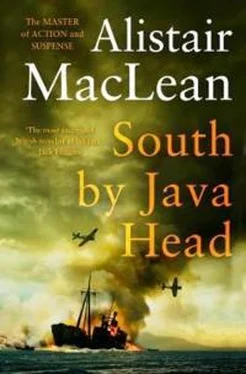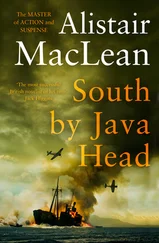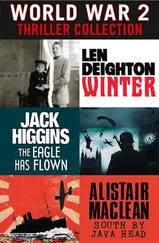Nicolson stepped into the passage, felt behind the door, found a key, withdrew it, stepped back out into the entrance hall, pulled the door softly shut behind him and locked it.
He recrossed the hall as softly as he had come and rejoined the others at the white-painted double doors. Both men looked at him as he approached – McKinnon still grim and implacable, his surging anger well under control but ready to explode at any moment, Telak a ghastly, blood-smeared sight under the lights, dusky face drawn and grey with fatigue, but revenge would keep him going for a long time yet. Nicolson whispered a few instructions in Telak’s ear, made sure he understood and waited until he had slipped away and hidden himself behind the right-hand staircase.
There was a low murmur of voices from behind the double-doors, a murmur punctuated by an occasional guffaw of laughter. For a few moments Nicolson listened with his ear to the crack between the two doors, then tested each in turn with an infinitely gentle pressure of a probing forefinger. Each yielded an almost imperceptible fraction of an inch, and Nicolson straightened, satisfied. He nodded at McKinnon. The two men lined up the guns at their sides, muzzles just touching the white-painted woodwork in front of them, kicking the doors wide open and walked into the room together.
It was a long, low room, wood-panelled and parquet-floored like the hall, with wide bay windows, mosquito-curtained. The far wall of the room had another, smaller window, and the two doors in the left wall had a long, oaken sideboard between them, this last the only wall furnishing. Most of the floor space was taken up by a U-shaped banqueting-table and the chairs of the fourteen men who sat around it. Some of the fourteen were still talking, laughing and drinking from the deep glasses in their hands, oblivious of the entrance of the two men, but, one by one, the sudden silence of the others caught the attention of those who still talked, and they too fell silent, staring towards the door and sitting very still indeed.
For a man allegedly mourning the death of his son, Colonel Kiseki was making a magnificent job of dissembling his sorrow. There was no doubt to his identity.
He occupied the ornate, high-backed chair of honour at the top of the table, a short, massive man of tremendous girth, with his neck bulging out over his tight uniform collar, tiny, porcine eyes almost hidden in folds of flesh, and very short black hair, grey at the temples, sticking up from the top of his round head like the bristles of a wire brush. His face was flushed with alcohol, empty bottles littered the table in front of him and the white cloth was stained with spilt wine.
He had had his head flung back and been roaring with laughter when Nicolson and McKinnon had entered, but now he was sitting hunched forward in his chair, tightly-gripping fists ivory-knuckled on the arms of his chair, the laughter in his puffy face slowly congealing into an expression of frozen incredulity.
No one spoke, no one moved. The silence in the room was intense. Slowly, watchfully, Nicolson and McKinnon advanced one on either side of the table, the soft padding of their feet only intensifying the uncanny silence, Nicolson to the left, McKinnon advancing up by the wide bay windows. And still the fourteen men sat motionless in their seats, only their eyes slowly swivelling as they followed the movements of the two men with the guns. Half-way up the left-hand side of the table Nicolson halted, checked that McKinnon had his eye on the whole table, turned and opened the first door on his left, let the door swing slowly open as soon as it had clicked, swung noiselessly round and took a silent step towards the table. As soon as the door had clicked an officer with his back to him, his hand hidden from McKinnon on the other side, had started to slide a revolver from a side holster and already had the muzzle clear when the butt of Nicolson’s automatic rifle caught him viciously just above the right ear. The revolver clattered harmlessly on to the parquet floor and the officer slumped forward heavily on to the table. His head knocked over an almost full bottle of wine and it gurgled away in the unnatural silence until it had almost emptied itself. A dozen pairs of eyes, as if mesmerised by the only moving thing in that room, watched the blood-red stain spread farther and farther across the snow-white cloth. And still no one had spoken.
Nicolson turned again to look through the now open door. A long passage, empty. He shut the door, locked it, turned his attention to the next. A cloak-room lay behind this, small, about six feet square and windowless. This door Nicolson left open.
He went back to the table, moved swiftly down one side of it, searching men for weapons while McKinnon kept his tommy-gun gently circling. As soon as he had finished searching he waited until McKinnon had done the same on his side.
The total haul was surprisingly small, a few knives and three revolvers, all of the latter taken from army officers. With the one recovered from the floor that made four in all. Two of these Nicolson gave McKinnon, two he stuck in his own belt.
For close, concentrated work the automatic rifle was a far deadlier weapon.
Nicolson walked to the head of the table and looked down at the grossly corpulent man sitting in the central chair.
“You are Colonel Kiseki?”
The officer nodded but said nothing. The astonishment had now vanished, and the watchful eyes were the only sign of expression in an otherwise impassive face. He was on balance again, completely under control. A dangerous man, Nicolson thought bleakly, a man whom it would be fatal to underestimate.
“Tell all these men to put their hands on the table, palm upwards, and to keep them there.”
“I refuse.” Kiseki folded his arms and leaned back negligently in his chair. “Why should I–” He broke off with a gasp of pain as the muzzle of the automatic rifle gouged deeply into the thick folds of flesh round his neck.
“I’ll count three,” Nicolson said indifferently. He didn’t feel indifferent. Kiseki dead was no good to him. “One. Two–”
“Stop!” Kiseki sat forward in his chair, leaning away from the pressure of the rifle, and started to talk rapidly. Immediately hands came into view all round the table, palms upward as Nicolson had directed.
“You know who we are?” Nicolson went on.
“I know who you are.” Kiseki’s English was slow and laboured, but sufficient. “From the English tanker Viroma . Fools, crazy fools! What hope have you? You may as well surrender now. I promise you–”
“Shut up!” Nicolson nodded at the men sitting on either side of Kiseki, an army officer and a heavy-jowled, dark-faced Indonesian with immaculately waved black hair and a well-cut grey suit. “Who are these men?”
“My second in command and the Mayor of Bantuk.”
“The Mayor of Bantuk, eh?” Nicolson looked at the mayor with interest. “Collaborating well, I take it?”
“I don’t know what you’re talking about.” Kiseki looked up at Nicolson through narrowed slits of eyes. “The mayor is a founder, a member of our Greater East Asia co-prosperity–”
“For heaven’s sake, shut up!” Nicolson glanced round the others sitting at the table – two or three officers, half-a-dozen Chinese, an Arab and some Javanese – then looked back at Kiseki. “You, your second in command and the Mayor remain here. The rest into that cloakroom there.”
“Sir!” McKinnon was calling softly from his place by one of the bay windows. “They’re coming up the drive now!”
“Hurry up!” Again Nicolson jammed his rifle into Kiseki’s neck. “Tell them. Into that cloakroom. At once!”
“In that box? There is no air.” Kiseki pretended horror. “They will suffocate in there.”
Читать дальше
Конец ознакомительного отрывка
Купить книгу










